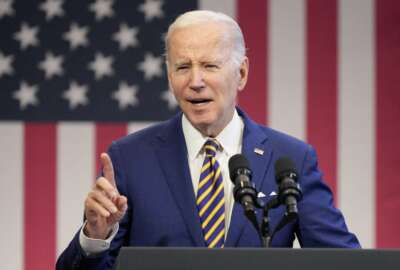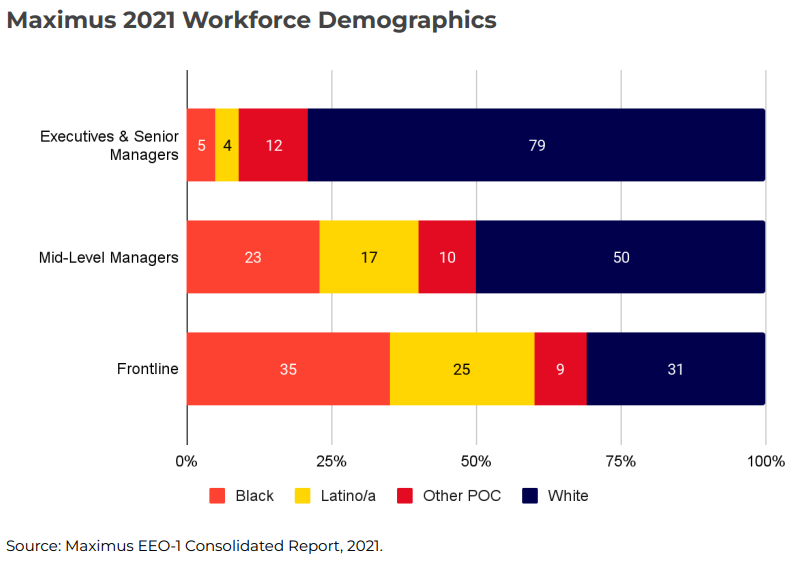
Labor leaders called on the Biden administration to investigate the workplace practices of federal contractor Maximus, claiming the company systemically prevents...
A large federal contractor employing thousands of call center employees is under fire for alleged racial and gender inequity and barriers to career advancement for lower-level staff members.
Labor leaders called on the Biden administration to investigate the workplace practices of Maximus, claiming that the company systemically prevents call center staff, who are predominately Black and Latina women, from advancing their careers.
Black and Latina women make up close to 50% of the contractor’s front-line workforce, and just 5% of company executives. In contrast, white men comprise 9% of front-line staff and about half of Maximus’ executives, according to a March 21 joint report from the Communications Workers of America (CWA), the NAACP and the Strategic Organizing Center (SOC). Overall, 76% of front-line employees at Maximus are women and 69% are people of color, the report said.
The report also reviewed Maximus’ recent press releases, finding that within the past year, 87% of executives the company hired were white, and 67% were male. Additionally, the report found that more than two-thirds of current managers were external hires, rather than internal candidates.

Beyond the stark contrast in workforce demographics by seniority, many call center employees said there is no clear career ladder or path to career advancement for front-line workers.
“Front-line workers at Maximus’ federal call centers report the company’s practices may perpetuate the lopsided demographics evident in its workforce data,” the report said.
A union-conducted survey from January, with about 300 respondents, found that many employees said they did not receive leadership training or adequate communication about opportunities for career growth. More than 60% of call center workers said they had applied for higher positions at Maximus, but nearly 75% of those employees were either turned down or never heard back about their applications, according to the survey.
Daija Arrington, a call center employee at Maximus, has experienced the career stagnation firsthand.
“I’ve been working in call centers for almost 10 years now and I have worked my way up to a tier-one customer service correspondence agent,” Arrington said during a March 21 press conference. “Despite being at call centers for this long, I have yet to obtain a supervisory role … I have applied for several different supervisory positions, however, Maximus has never given me a yes or no as to why I’ve never been selected.”
Roughly 10,000 customer service agents across 10 call centers, concentrated mainly in offices across the Southern U.S., work at Maximus. Nearly all of the company’s revenue, which totaled $4.63 billion in fiscal 2022, comes from contracts with federal and state government agencies, according to the report. The company’s largest contract is with the Centers for Medicare and Medicaid Services (CMS).
Maximus said it takes “strong issue” with the report, calling the claims and research “undocumented and uncorroborated.”
“Maximus is committed to diversity, equity and inclusion, and we continue to make significant progress with our long-term commitment to build a strong and diverse workforce,” Eileen Cassidy Rivera, Maximus’ vice president of public relations and communications, said in an email.
The federal contractor last year released a report on its diversity, equity and inclusion practices, which showed generally more positive statistics and employee feedback on the company’s policies.
Regarding the concerns about career stagnation, Rivera said the contractor is open to ideas and feedback on how to strengthen career ladders. Currently, Maximus offers more than 25 different career paths for federal employees in engineering, program management and operations, she added.
“As testament to the strength of our career development programs, most of the supervisor and leadership positions in our operations teams were identified and filled through internal candidates,” Rivera said.
But union and labor leaders said Maximus has opposed several of their proposals, including calls to conduct a racial equity audit, and to release its workforce demographic data from 2022. Maximus ultimately submitted a summary of its racial and gender workforce data to the Equal Employment Opportunity Commission last November.
The company, though, reiterated that during routine government audits of the operations, hiring and promotion practices, Maximus consistently passes across all of its locations.
“We hold ourselves accountable, from the executive level to those working every day serving millions of Americans seeking information and connecting with essential benefits,” Rivera said.
The advocacy groups also wrote a letter to leaders at the Labor Department, calling on the agency to conduct an investigation of systemic racial disparities in Maximus’ workforce.
“There appear to be barriers to advancement of front-line workers — who are predominantly women and people of color — beyond the lowest rungs of Maximus’ corporate ladder,” the group said in a March 21 joint letter to Labor officials.
Union and labor leaders said their report’s findings come in stark contrast to the Biden administration’s efforts to advance racial equity in federal services, largely stemming from an executive order the President signed on his first day in office, as well as an additional order from February this year.
“We’re calling on the Biden administration to live up to its proclamation, the executive order, as well as the spirit of ensuring a decent wage and living environment for workers,” said Derrick Johnson, CEO of NAACP, during the union press conference. “We call on this administration to live up to its commitment in terms of equity and opportunity in the workspace — not allow federal tax dollars to be used to discriminate against workers and disadvantage those workers so executives can make profits and give themselves bigger bonuses.”
The calls of the advocacy groups gained support from Rep. Bennie Thompson (D-Miss.). Some of Maximus’ employees are residents of Mississippi.
“It’s unfortunate that in this day and time, a federal contractor would treat any worker, especially federal workers, like this,” Thompson said during the union press conference. “I’m joining the NAACP, CWA and other organizations of goodwill and calling on the Biden administration to step forward, look at the issues, and if this contractor is in violation of the intent and spirit of this whole issue around equity and inclusion, to hold them accountable. Either fix it or find us another contractor who will.”
The demographics at Maximus also come in contrast to those at the IRS and the Social Security Administration, two agencies that also employ large numbers call center workers.
“The Maximus front-line workforce is majority women and majority of people of color, and the Social Security and IRS workforces also have substantial portions of women and people of color at the front line,” said David Rosenblatt, a director at SOC, during the press conference. “But when you move up the ladder at those federal agencies, those groups are more evenly represented at each level of the hierarchy compared to Maximus.”
Specifically, at the IRS, Black employees comprise 30% of non-supervisory positions and 26% of leadership-level roles. Women make up 65% of non-supervisory staff and 74% of leadership, according to the report, which compiled Office of Personnel Management data from 2021.
At SSA, Black employees make up 30% of the overall workforce, comprising 31% of non-supervisory roles, 33% of leadership-level positions. Women make up roughly two-thirds of SSA’s workforce at both the non-supervisory and leadership levels.
“The IRS and SSA are models of equity in comparison to the vast racial and gender disparities that exist at Maximus and show what is possible when federal agencies are committed to equitable opportunities for all workers,” the union’s report said.
Arrington, the long-time call center employee in Mississippi, said making long-term changes to career development opportunities at Maximus would take both accountability and action. And so far, she has not seen that.
“I’ve always believed that when life gives you lemons, you make lemonade, so it’s never a half-empty type situation,” Arrington said. “But with Maximus, I can’t help but look at it as a half-empty type situation, because I see that there is no growth for me.”
Copyright © 2025 Federal News Network. All rights reserved. This website is not intended for users located within the European Economic Area.
Drew Friedman is a workforce, pay and benefits reporter for Federal News Network.
Follow @dfriedmanWFED
